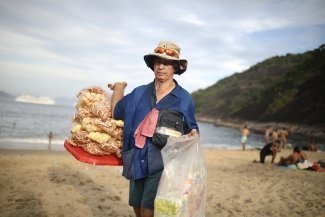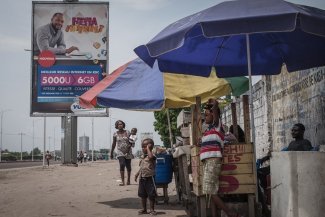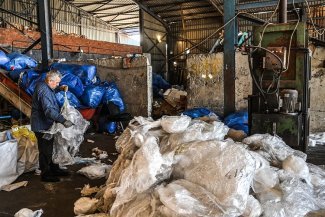In the high-density neighbourhood of Chinsapo in the Malawian capital of Lilongwe, Rastafarian priest Storm Jericho Kadondo carefully uproots the weeds surrounding a cannabis plant he is secretly growing behind the fence of his house.
“As a Rastafarian I grow at least a tree of cannabis for meditational use. But I have to grow the holy tree in secret because it is illegal to grow it here,” says Kadondo who is the executive director of the Rastafarian Fellowship Association.
All forms of cannabis cultivation – from marijuana, which contains higher levels of the psychoactive compound THC and is used for medicinal and recreational purposes, to hemp, which has negligible levels of THC and numerous industrial uses – are illegal in Malawi. However, the country is reputed to be one of the biggest producers of the plant in southern Africa. And Malawi Gold, a particularly potent strain of marijuana (known locally as chamba), is beloved by cannabis connoisseurs the world over.
For years now Malawi’s sizeable Rastafarian community has been calling for the legalisation of the cultivation, supply and possession of marijuana as smoking the plant is seen as a key tenet of the Rastafari movement. Now their once fringe demands are going mainstream as the price of tobacco, which accounts for approximately 60 per cent of Malawi’s foreign earnings, has plunged on the global market.
In tandem, growing international support for the decriminalisation and legalisation of cannabis is having an impact on the way the plant is perceived. There has been particularly strong support for the legalisation of hemp, which can be used to produce a variety of commercial products ranging from textiles to cosmetics.
“Malawi is losing millions of dollars in export earnings as the global community takes a strong stance against tobacco smoking. The Rasta community believes that the legalisation of marijuana cultivation can turn around the country’s economic fortunes,” Kadondo tells Equal Times. In 2018, auction prices for Malawi’s tobacco farmers were US$1.58 per kilogram; cannabis can fetch 30 times that amount.
Kadondo, says the Rastafarian Fellowship Association has written to the Malawi Law Commission and the Malawi Human Rights Commission to urge the government to follow in the footsteps of countries like Uruguay and Canada by legalising all forms of cannabis.
“Marijuana has many vital properties. The plant has cannabidiol oil [commonly known as CBD or hemp oil] which is in high demand because of its curative elements,” says Kadondo.
Ras Chikomeni Chirwa agrees. The musician and farmer became an overnight celebrity earlier this year after he attempted to run in the country’s presidential elections which takes place this May. Although Chirwa was disqualified because he didn’t meet some of the basic requirements for a nominee, his promise to legalise cannabis won him many supporters.
“The government is failing to make a clear stand on marijuana cultivation,” he tells Equal Times. “The government is acting like cannabis is a new substance, yet it has been used to cure a wide range of diseases for many generations and offers economic opportunities for the country.”
The economic potential of cannabis, despite price slumps
According to a 2011 World Bank report, the trade in marijuana accounts for approximately 0.2 per cent of Malawi’s annual GDP. And while the wholesale prices of marijuana in the some US states (a major global market for cannabis) fell by as much as 50 per cent between 2017 and 2018 due to the high volume of growers flooding the market, cannabis research firm Brightfield Group projects that the legal cannabis market could expand by as much as 60 per cent by 2021, to US$31.4 billion. Such a development could present a huge opportunity for countries like Malawi, where agricultural commodities account for 80 per cent of all exports and agriculture accounts for 80 per cent of all jobs.
The move to legalise cannabis in Malawi took a massive leap forward last December when parliament approved a proposal by Boniface Kadzamira, an independent MP for Ntchisi North in central Malawi, to draft a bill which would allow for the cultivation, production and possession of industrial hemp and marijuana for medical use. While parliament gave the go-ahead for industrial hemp trials, legislators are currently discussing the proposed bill.
This isn’t the first time Malawi’s parliament has debated the legalisation of cannabis. Joe Manduwa, a former deputy agricultural minister, was the first parliamentarian to champion the legal cultivation of industrial hemp back in April 2000. It is a stance he still maintains today.
“Legalised hemp cultivation would turn around the country’s economy as it is cheaper to cultivate as compared to tobacco, yet it fetches good prices on the international market,” says Manduwa.
He says it could also help create new jobs, in a country where poverty levels continue to increase: “We are complaining of high rates of unemployment in the country yet if marijuana is legalised it could bring jobs to the youth who are idly walking our streets,” says Manduwa.
He is, however, quick to point out that there is an urgent need for a civic campaign to educate people on the differences between industrial hemp and marijuana.
Similar sentiments are shared by British investor Tanya Clarke who manages the National Industrial Hemp Association of Malawi and has been leading research into industrial hemp cultivation in the country since 2015.
“[Many] Malawians align themselves to religion, and the advocacy of industrial hemp legalisation has suffered because it has been argued on a religious angle. Additionally, many Malawians have challenges in the access to information and this information gap has made them to only look at the negative sides of hemp cultivation,” says Clarke.
However, anti-drug activists continue to warn that by relaxing the rules around industrial hemp cultivation, growers are likely to abuse the law by growing marijuana which could increase drug use amongst youth in the country.
“It is true that we might be enticed to go for industrial hemp for the economic benefits, however we also have to consider the social and moral impacts that the legalisation of marijuana could have on the nation,” says Nelson Bazwell Zakeyo, the executive director of Drug Fight Malawi. Anti-legalisation campaigners such as Zakeyo warn that the negative impact of frequent marijuana use can range from a decline in cognitive function to psychotic disorders.
Dr Hetherwick Ntaba, a medical doctor and former foreign minister (1993 to 1994) who supported the legalisation of hemp cultivation when it was first introduced to parliament by Manduwa almost 19 years ago, argues that there is a lot of misinformation surrounding the use of marijuana, and that there is no scientific proof that it is any more dangerous or addictive than controlled substances such as tobacco and alcohol.
“The problem with us Malawians is that we are too conservative and we are treating hemp as a new substance. Those that are in opposition to hemp cultivation argue it would increase crime rates, but this argument lacks logic. The benefits of legalisation outweigh the negatives.”









